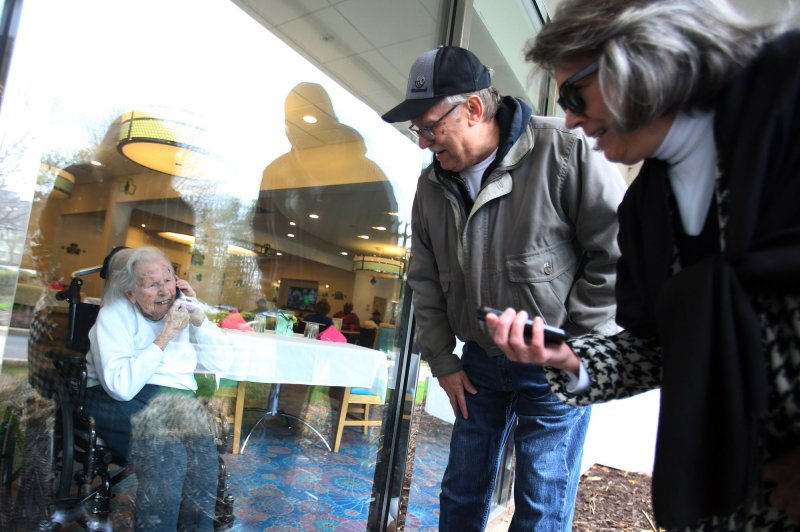Wilma Grove uses a cell phone to talk to her children, Judy Kekich and Ed Grove, during their visit to Delmar Gardens on the Green in Ballwin, Mo., in March. Photo by Bill Greenblatt/UPI |
License Photo
May 21 (UPI) -- Proactive testing and strict quarantining procedures at assisted-living facilities can help prevent outbreaks of COVID-19 among residents and the staff, a study published Thursday by JAMA Internal Medicine found.
Taking this approach at an unnamed facility in Seattle effectively limited cases of the new coronavirus, SARS-CoV-2, to six -- four among 80 residents and two among 62 staff members -- researchers said.
"Assisted-living facilities are vulnerable to COVID-19, even though residents are in their own apartments, and older adults can be asymptomatic, so testing is key after an exposure to determine who may be infected," study co-author Dr. Alison C. Roxby, assistant professor of medicine and global health at the University of Washington, told UPI.
Nursing homes, assisted-living facilities and other specialized residences for older adults have been hit hard during the ongoing pandemic.
For example, early in the U.S. outbreak, the Life Care Center nursing home in Kirkland, Wash., just outside Seattle, identified nearly 130 cases of COVID-19 among residents and staff -- and at least 35 of those infected ultimately died.
And, up to 40 percent of all coronavirus-related deaths in New York and New Jersey have been among residents of similar facilities, according to health officials in both states. Older adults are among those at higher risk for serious illness from the new coronavirus, according to the CDC.
For the research, Roxby and colleagues from Public Health-Seattle and King County, UW Medicine and the U.S. Centers for Disease Control and Prevention tested residents and staff members at the Seattle facility according to CDC guidance recommendations.
All 80 residents, who had a mean age of 86, were tested regardless of whether they felt ill, the researchers said.
None of the residents was ill during initial testing, researchers said, although one male resident reported a resolved cough and one loose stool in the 14 days before the evaluation. Both of the staff members who tested positive reported symptoms, the researchers said.
Retesting one week later identified one new case of COVID-19 in a facility resident, researchers said. All residents remained in quarantine and were clinically stable 14 days after the second test, with no hospitalizations or deaths reported as of early April, they said.
Although symptom screening failed to identify residents with COVID-19, and all four residents with the virus remained asymptomatic after 14 days, aggressive testing likely helped prevent a "widespread facility outbreak," the researchers said.
"Until we have a vaccine, persons in vulnerable populations, including older adults living in congregate settings like assisted living, will need to limit their possible exposures to protect themselves and the other members of their communities," Roxby said.
"Physical distancing is also important in this setting, and can be effective to avoid an outbreak," she said.
"Current restrictions on activities for residents in assisted living, including minimizing visitors, avoiding group activities and keeping 6 feet away from others, remain important when COVID-19 is circulating in the community. Unfortunately, this risk will be with us for the foreseeable future."















